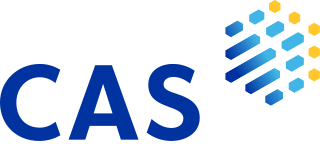
Chemical Abstracts Service (CAS) is a division of the American Chemical Society. It is a source of chemical information and is located in Columbus, Ohio, United States.

In organic chemistry, aromatic sulfonation is an organic reaction in which a hydrogen atom on an arene is replaced by a sulfonic acid functional group in an electrophilic aromatic substitution. Aryl sulfonic acids are used as detergents, dye, and drugs.
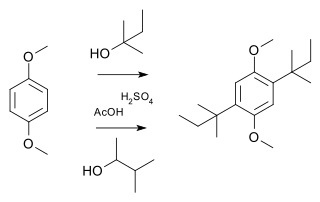
A Wagner–Meerwein rearrangement is a class of carbocation 1,2-rearrangement reactions in which a hydrogen, alkyl or aryl group migrates from one carbon to a neighboring carbon. They can be described as cationic [1,2]-sigmatropic rearrangements, proceeding suprafacially and with stereochemical retention. As such, a Wagner–Meerwein shift is a thermally allowed pericyclic process with the Woodward-Hoffmann symbol [ω0s + σ2s]. They are usually facile, and in many cases, they can take place at temperatures as low as –120 °C. The reaction is named after the Russian chemist Yegor Yegorovich Vagner; he had German origin and published in German journals as Georg Wagner; and Hans Meerwein.
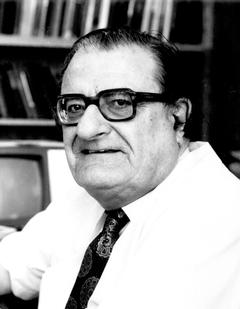
Michael James Steuart Dewar was an American theoretical chemist.
Physical Chemistry Chemical Physics is a weekly peer-reviewed scientific journal publishing research and review articles on any aspect of physical chemistry, chemical physics, and biophysical chemistry. It is published by the Royal Society of Chemistry on behalf of eighteen participating societies. The editor-in-chief is Anouk Rijs,.
The Ramberg–Bäcklund reaction is an organic reaction converting an α-halo sulfone into an alkene in presence of a base with extrusion of sulfur dioxide. The reaction is named after the two Swedish chemists Ludwig Ramberg and Birger Bäcklund. The carbanion formed by deprotonation gives an unstable episulfone that decomposes with elimination of sulfur dioxide. This elimination step is considered to be a concerted cheletropic extrusion.
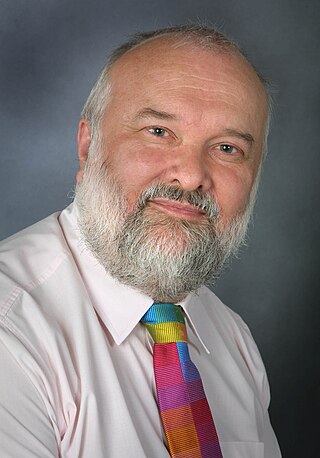
Henry Stephen Rzepa is a chemist and Emeritus Professor of Computational Chemistry at Imperial College London.
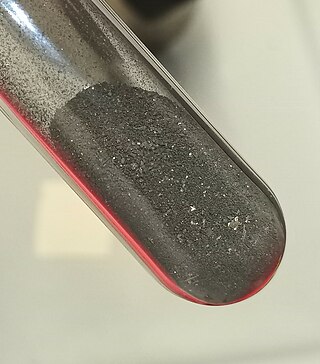
A Rieke metal is a highly reactive metal powder generated by reduction of a metal salt with an alkali metal. These materials are named after Reuben D. Rieke, who first described along with an associate in 1972 the recipes for their preparation. In 1974 he told about Rieke-magnesium. A 1989 paper by Rieke lists several metals that are allowed by the periodic table to be produced by his process: Cd, Zn, Ni, Pt, Pd, Fe, In, Tl, Co, Cr, Mo, W, Cu, which in turn are called Rieke-nickel, Rieke-platinum, etc.
The SPRESI data collection is one of the largest databases for organic chemistry worldwide. The database covers the scientific literature from 1974 to 2014, focusing on organic synthesis. It contains information on 5.8 million chemical structures and 4.6 million chemical reactions abstracted from 700,000 references.

ChemPlusChem is a monthly peer-reviewed scientific journal covering chemistry and published by Wiley-VCH on behalf of Chemistry Europe. It was established in 1929 by E. Votoček and J. Heyrovský and renamed in 1939 to Collection tschechischer chemischer Forschungsarbeiten/Collection des travaux chimiques tchèques/Collection of Czech Chemical Communications for one year. Publication was suspended until 1947, when it resumed publication as Collection of Czechoslovak Chemical Communications. It obtained its current name in 2012.
The Gmelin database is a large database of organometallic and inorganic compounds updated quarterly. It is based on the German publication Gmelins Handbuch der anorganischen Chemie which was originally published by Leopold Gmelin in 1817; the last print edition, the 8th, appeared in the 1990s. Although published over many decades, the printed series was not uniform in coverage or currency. Some elements are represented only by decades-old and not updated slim summary volumes. Others have numerous supplements. Most later supplement volumes focused on an element's organic complexes. Each volume lists its literature coverage date.

The Zeitschrift für anorganische und allgemeine Chemie is a semimonthly peer-reviewed scientific journal covering inorganic chemistry, published by Wiley-VCH. The editors-in-chief are Thomas F. Fässler, Christian Limberg, Guodong Qian, and David Scheschkewitz. Originally the journal was published in German, but nowadays it is completely in English.

Friedrich Krafft was a German chemist. He studied with Friedrich August Kekulé von Stradonitz, Rudolf Clausius and Gerhard vom Rath.
Chemisches Zentralblatt is the first and oldest abstracts journal published in the field of chemistry. It covers the chemical literature from 1830 to 1969 and describes therefore the "birth" of chemistry as science, in contrast to alchemy. The information contained in this German journal is comparable with the content of the leading source of chemical information Chemical Abstracts Service (CAS), which started publishing abstracts in English in 1907.

Willy Marckwald was a German chemist.
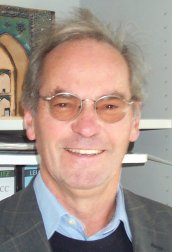
Johann Gasteiger is a German Chemist and a Chemoinformatician on which he wrote and edited various books.
Rakesh Kumar Jain is an Indian virologist and the former head and coordinator of the Microbial Type Culture Collection (MTCC), a national research centre located at the Institute of Microbial Technology campus. He is known for his research in virology. His studies have been documented by way of a number of articles and the online article repository of John Wiley & Sons has listed several of them. Besides, he has edited one book, A Century of Plant Virology in India, an 805-page volume compiling the research done in the field of plant virology in India during the last 100 years. The Department of Biotechnology of the Government of India awarded him the National Bioscience Award for Career Development, one of the highest Indian science awards, for his contributions to biosciences in 2002.
Olga García Mancheño is an organic chemistry professor at the University of Münster in Germany. García Mancheño directs an organic chemistry research group at University of Münster that focuses on development of new catalytic methods with the goal of developing sustainable synthetic routes to accomplish carbon-hydrogen functionalization, organic chemical rearrangements, and photocatalyzed chemical reactions.









